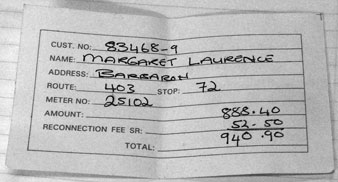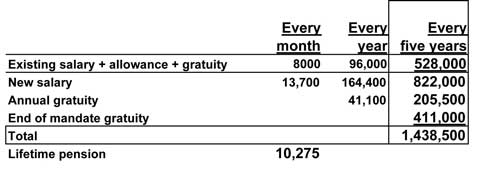


The Public Utilities Corporation (PUC), the State monopoly provider of electricity, chose a Friday afternoon to summarily disconnect power to the modest home of a family in dire strait living in government provided flat.

For a whole weekend, the family was left in complete darkness when night fell. Margaret Laurence and her three children had to rely on candles. On the Monday morning the mother had to prepare her three children to return to school for the new school year. All her children go to the local state school.
The move to cut off electricity supply to the family came barely two weeks after the State owned Public Utility Company (PUC) announced a 60% increase in the price of electricity and water. This decision has resulted in the price of one unit of electricity rising from 69 cents to R1.29. For this poor family this is a double blow since the mother has virtually no income and has received no income support from the social security system.
But while thousands of modest homes across the country, like that of this family, have been struggling to pay their electricity bills each month, the utility company, in a secret agreement signed by the government in December 2003, has been selling electricity to the Indian Ocean Tuna (IOT) company at only 45 cents a unit. This agreement was renewed for another three years in 2006. As a result, during the last fiscal year (2007) the Government sent a cheque to IOT to the tune of SR 22,500,000 (22.5 million). This sum was paid out even though it had not been approved by the National Assembly when the budget was voted on in December 2006. While IOT was supposed to bring benefits to Seychelles, it appears we have ended up paying them millions of rupees for that privilege – money that could go towards assisting families in dire straits like that of Margaret Laurence.
IOT is not the only entity that gets government consideration while families in the same plight as that of Margaret Laurence are left to fend for themselves as the prices of almost everything in the shops have skyrocketed because of the government’s ill-advised policy of devaluation.
Margaret Laurence is represented in the National Assembly by Waven William from the SPPF, the party of President James Michel. Just before Christmas William, together with all his colleagues on the SPPF bench as well as on the SNP benches, voted themselves a hefty increase in wages and benefits. William’s monthly salary and allowance (as a result of the vote) will rise from R8, 000 to R13, 000 a month, a whopping R5000 a month or more than 62.5% increase. Consequently, William’s annual income will increase to R156, 000 from R96, 000. What more, under the law, which William and his colleagues in the National Assembly voted on, they will also earn an annual gratuity of 25% based on their annual salary. This will earn him an additional R39, 000 a year.

That is not all. After his five-year mandate, William will earn an additional gratuity of 50% of his total salary for the five years, which will net him another R397,500. In other words, if he fulfils his five year mandate, Waven William, the SPPF MNA representing Margaret Laurence in the National Assembly, will have earned a total of R1,391,250 in salary and allowances.
There is more. According to the new law, which Waven William voted for just before Christmas, he will also be entitled to a monthly pension ranging from 20% to 75% of his monthly salary of R13, 000, for the rest of his life.
While Waven William and his SPPF and SNP colleagues in the National Assembly will barely feel the pinch when their electricity bills with the increased rates start arriving in February, Margaret Laurence – William’s constituent, will be struggling to earn enough in order to survive and feed her three children who are all of schooling age. She does not know how she would pay her next electricity bill.
In reality, Margaret Laurence has no income and had virtually none for the last two years. The meagre income, which her fisherman live-in boyfriend brings home (mostly just enough to keep off the hunger pains of the children), is not sufficient to pay the electricity bill each month even before the recent rise in rates. She survives from financial support she gets from her relatives as well as donations from benefactors. She has not purchased any clothes for herself or her children in the last two years. The children wear second hand clothes.
Granted, her financial situation was not always that dire. From 04 January 2001 until 17th March 2006, she was employed as a Senior Security Guard with the Seychelles National Guard. Her last salary was R2,925 a month, from which the government deducted R600 up-front for the rent of a two-bedroom government-owned flat and R146.25 as her contribution to the Social Security Fund. This left her with R2,178.75. However, in order to work, Margaret had to send her youngest child to a child minder, which cost her R400 a month. This meant her disposable income was further eroded to R1,778.75 with which to feed and cloth her family, as well as pay the electricity and water bills, in addition looking after her ailing grandmother.
Margaret did not lose her job, nor was she sacked. She left her employment so she could look after her ailing grandmother who had become immobile. Her effort to get social assistance for her grandmother so that she could keep her job proved fruitless. Neither the DA nor her local MNA had anytime for her and her family’s predicament. She said she could find no one in the management of the National Guard she could talk to about her predicament. Ironically, she said, she had always voted for the SPPF. This meant her entire family survived on her grandmother’s state pension of R 1500 a month once she left her employment.
Although her grandmother died shortly after she left her full time job to look after her, the National Guard would not give her the job back. She was told the institution was to be abolished, therefore, was not taking any more recruits. Moreover, she has not been able to get a job elsewhere despite her good employment reference from the National Guard. Margaret has not paid rent on her government flat since her last salary cheque from the National Guard two years ago. She does not remember the last time she paid rent for her flat. Margaret and thousands like her who voted for the SPPF in the past are now paying the price under the JJ spirit. They did not choose to live in poverty; it is being imposed upon them by the very same people they supported at the last election…..